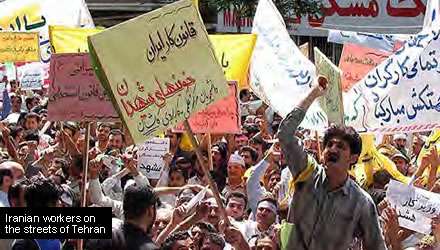Opposition to imperialism does not mean support for Ahmadinejad
 international |
anti-war / imperialism |
other press
international |
anti-war / imperialism |
other press  Thursday April 01, 2010 14:10
Thursday April 01, 2010 14:10 by John Cornford
by John Cornford
Yassamine Mather interviews Mohammad Reza Shalgouni in the article below. Mohammad is a founder-member of the Organisation of Revolutionary Workers of Iran (Rahe Kargar) and has been a leader of the organisation for many years. Mohammad spent nine years as a political prisoner in Iran under the shah and today is an active supporter of Hands Off the People of Iran. In this interview he sstresses the need to oppose Imperialism as well as opposing Ahmadinejads regime. Full text at link.
Mohammad Reza Shalgouni
The office of Iran’s supreme leader is not only in total confrontation with the people, but at the same time most of the Shia ayatollahs who are accepted as sources of religious guidance are trying to distance themselves from him. The truth is that the traditional Shia religious governance is a form of republic (in the way Engels refers to the Protestant church as the ‘republican church’ and the Catholic church as the ‘Royalist church’), but now vali faghih is trying to change it into a royalist system, making the independence of centres of guidance impossible.
Contrary to the illusions of some left groups outside Iran, Ahmadinejad’s so-called ‘pro-disinherited’ policies played an important role in worsening the structural crisis of Iran’s economy. The first term of the Ahmadinejad presidency coincided with an unprecedented rise in the price of oil and he spent a substantial part of the country’s oil income, as well as the country’s foreign exchange reserves, strengthening the social position of vali faghih. By injecting most of these resources into projects that had no economic value and only benefited the regime’s inner circles, the government created unprecedented inflation, the main burden of which fell on the shoulders of workers and toilers. It is enough to remember that, according to Ahmad Tavakoli (head of the research centre of the Islamic Majles, and one of the most hard-line Principlist-conservative factions of MPs), 46% of all the the ‘quick turnaround’ policies claimed by Ahmadinejad to confront unemployment never existed. In other words, all these claims were a cover for giving credit and low-interest loans (at times no-interest loans) to close associates of the vali faghih. Of course, had it been any different, it would have been surprising, because corruption is endemic in Iran’s Islamic Republic.
But the important issue is that opposition to the imperialist policies of the US and its allies must not lead to support for the Iranian government. Unfortunately the position of certain ‘anti-imperialist’ forces in the west is as damaging as the stance of those who support military intervention and sanctions. It is vital to oppose war and sanctions, but it must never take the form of supporting the dictatorial, bloodthirsty and obscurantist Islamic Republic. We must not forget that any support for the Islamic regime discredits leftwing and socialist ideas and in practice strengthens the hand of the US and its allies. Whether they like it or not, leftwing apologists for the regime actually help strengthen the imperialist, pro-capitalist camp in our country.
